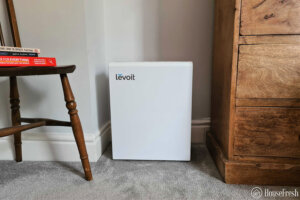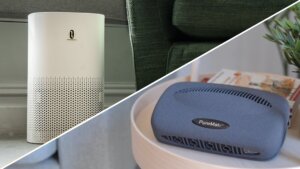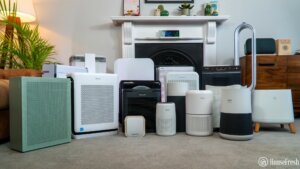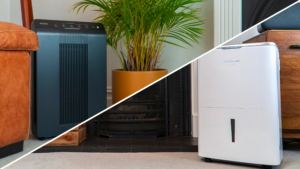In recent years, air purifiers and essential oil diffusers have been on the rise. Both bring their own unique element to our homes and are used for different reasons. While air purifiers are scientifically proven to improve indoor air quality, oil diffusers provide a calming sensation, creating beautiful aromas in our living space.
The difference between the two products is substantial, but both can play a huge part in making our homes a safe scented haven. In this article we will further explore the differences between the two.
Air purifiers

Air purifiers play a major role in removing harmful particles from indoor spaces. Most units are persistent in tackling mold, odor, allergens, and indoor toxins, which can silently occur within our households. They work by drawing in contaminated air using a fan, which then passes through filters, the filters capture small and large particles from our indoor space, and the air is then released back into our environment completely cleansed.
Some of the best purifiers on the market function through a three-stage filtration system:
| HEPA Filter | HEPA filters are proven to remove 99.97% of indoor pollutants such as dust mites, mold, bacteria, pollen, and pet dander. A HEPA filter is the most important component in an air purifier. Mainly consisting of extremely fine fibers, they work by capturing small and large particles that exist within your indoor space, giving you a fresh and clean environment. Although these filters are proven to help with underlying health issues such as asthma and allergies, they are not a replacement for medication, rather a great way to relieve irritation that people with sinus problems suffer from. |
| Carbon Filter | Carbon filters help trap odors and Volatile organic compounds (VOCs) by absorption. This process means molecules attach themselves to the outside of the filter’s surface rather than soaking into it (similar to how a magnet attracts particular metals). Carbon filters commonly consist of two types, a granular activated carbon filter which is made of activated charcoal and tiny loose granules of carbon, and a carbon block filter, made of loose pieces of carbon compressed together. |
| Pre-filter | Pre-filters generally protect other filters in your unit from large particles getting through. Although HEPA filters have no problem capturing larger particles, a pre-filter helps prolong the lifespan of the HEPA filter, therefore maximizing its full potential. |
Different units specialize in particular areas but many will tackle multiple irritants that make their way into your home. It is important to carry out regular maintenance by cleaning your unit and replacing the filters when needed. HEPA and carbon filters usually last for 6-12 months of use depending on how regularly you use your product.
Essential oil diffusers

Essential oil diffusers are widely known for their blissful mists of relaxation and calming aromas. But what is it that makes them so attractive and why do people find themselves drawn to them? While oil diffusers are not proven to improve your indoor air quality, they can have a substantial effect on your mental state and mindset.
Many people turn to aromatherapy at the end of a long day, whether it’s from being in a stressful environment or just as part of their unwinding routine, oil diffusers will gracefully help with relaxation, just like drawing a nice hot bath. The easy-to-breath mist will help with dry skin, itchy throats, and anxiety.
There are four types of oil diffusers:
| Nebulizing | Breaks down essential oils through a high velocity, pressurized air stream, and jet. A light mist is created and releases a calming scent that is safe to inhale. |
| Ultrasonic | Uses water and electronic frequencies to create a soothing mist. Only a small amount of oil is required in an ultrasonic product and no heat is used to produce the mist. These models can also be used as a humidifier making them great for people with sinus issues. |
| Heat | Uses heat to gradually evaporate essential oils. The oil is mixed with water to produce an aroma. The best units will use low levels of heat to avoid changing chemical constituents too drastically. |
| Evaporative | Airflow is the main component of evaporative diffusion. A fan blows through the filter to help spread the scent of essential oils. The air causes the oil to evaporate quickly around your living space. |
Comparing how air purifiers work to how oil diffusers work
An air purifier is a unit you’ll want to invest in if your indoor air quality is contaminated. Air purifiers will remove 99.97% of pollutants and are proven to provide multiple health benefits. Essential oil diffusers are strongly recommended for aromatherapy by creating a blissful state of calm. While they are not scientifically proven to improve any underlying health issues, essential oil diffusers are believed to benefit your mental state and are used as a great tool to unwind and relax.

Common questions about oil diffusers and air purifiers
Depending on what you’re looking for the answer is different. If it’s air quality you need, then an air purifier is what’s required. An air purifier’s technology is designed to tackle dust mites, pet dander, mold, allergies, odor, and other indoor contaminants.
Oil diffusers, however, produce a calming mist of scented aromas, perfect for relaxation and peace of mind. The two function very differently but are both beneficial, air purifiers are scientifically proven to improve indoor air quality, making them technically the healthier option. Oil diffusers, on the other hand, have positive well-being factors that can help with anxiety and depression.
Yes, an oil diffuser and an air purifier can be used simultaneously together. It is super safe and will not cause any irritation to your health or mood. Our research shows that using an air purifier and essential oil diffuser in conjunction with one another will maximize health benefits as the air you’re breathing in is not contaminated and your environment is stress-free.
Final thoughts
Air purifiers and essential oil diffusers function in completely different ways, but both can have a great effect when using them in conjunction with one another. Your living area will be free of indoor pollution and contaminants as well as enriched with scented aromas for your zen space. While some air purifiers are brilliant at tackling odor, it usually applies to more predominant and strong-smelling scents, such as pet or cooking odor. Most essential oil diffusers will bypass the purifier’s filter and still function well, however they may diminish the aromas to a small degree depending on how long you leave your unit on.






